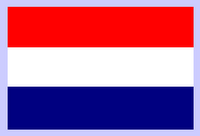THE NETHERLANDS--WHAT A DIRTY COUNTRY
It is a common saying that “money is the root of all evil.” According to the Random House Dictionary of Proverbs and Sayings, the phrase first appeared in English circa 1000 A.D. The saying originated in the New Testament.
“For the love of money
is the root of all evil.”--Timothy, 6:10.
is the root of all evil.”--Timothy, 6:10.
By Finfacts Team
Feb 20, 2006
A study commissioned by the Dutch Finance Ministry estimates the amount of money laundered in the Netherlands at €18.5 billion ($23 billion USD) €17.7 billion ($22 billion USD) comes from crimes committed abroad, €1.8 billion ($2.2 billion USD) from domestic crimes. The most important money laundering channels are real estate investments, export under invoicing and import overpricing and money laundering through special purpose entities.
The report puts the Netherlands on the 7th position in a world ranking, together with countries such as France and Germany. Money laundering accounts for about 5% of Dutch GDP.
The report says that growth effects from money laundering are in principle positive for the Dutch (see chapter 6). One billion of additional money laundering leads to about 0.1% more growth. As long as the Dutch can profit from being a transit country of criminal activities and criminal financial flows, they will most likely rather profit than suffer from these activities. The same most likely will hold true for employment, especially in the financial services sector.
However, if money laundering attracts more crime, the growth effect will turn negative. If money laundering leads to an increase in one million more crime cases, then growth will fall by about 0.3% points. This brings us to the dangers of money laundering.

Finance Minister Gerrit Zalm has announced that he will investigate whether or not additional measures, on top of supervisory measures already taken, (if he deems they) are necessary.
The authors say that their results indicate that there is €8 to €14 billion ($10-18 billion USD) from crime generated in the Netherlands of which for laundering. This means that money laundering from crime in the Netherlands amounts to €3.2 to €4.2 billion per year ($4-5.2 billion USD), with the most likely estimate to be €3.8 billion ($5 billion USD). The remaining Dutch criminal money will be placed somewhere else.
In addition, criminal money from abroad will also flow into the Netherlands. There is also an additional €14 to €21 billion ($18-26.3 billion USD) that flows into the Netherlands from the top 20 origin countries of generated money for laundering. This means that the amount of money laundering with which the Dutch have to deal accounts for about €18 to €25 billion ($23-31 billion USD), hence about 4% of the Dutch money demand, or about 5% of the Dutch GDP.
The Netherlands is a transit country for crime and criminal money
The report says that the Netherlands is a transit country for crime. Dutch expertise in financial logistics and its excellent location make the Netherlands a perfect place to use existing legal nodes and networks for crime.The international position of the Netherlands as a trading nation in legal markets also makes it attractive for international illegal trading, with criminals hiding their gains, goods and services in the overall trading network.
Many forms of organized crime have to do with international smuggling activities – drugs, human trafficking, women for prostitution, arms, stolen vehicles, cigarettes – and other transnational illegal activities such as money laundering and fraud.
Family ties are important for international criminal associations. Good Dutch infrastructure combined with effective transnational social links and kinship networks help the Colombian cocaine, Turkish heroin and Moroccan hashish trade and make the Netherlands an important transit country for drugs in Europe. This is in addition to locally produced synthetic drugs that are illegally traded worldwide.
What are the effects of money laundering?
In chapter 4, the authors identify 25 potential effects that money laundering can have. From the literature, we consider the following the most important for the Netherlands:
Losses due to crime related to money laundering. Company losses through crime are about €2 billion ($2.5 billion USD) per year. The economic, social and political consequences of drugs account for about 0.4% of GDP per year.
Distortion of investment, in particular in the real estate sector. A lot of money laundering seems to finally end by investing large amounts of wealth in real estate. This sector is less transparent than financial markets, legal persons can act instead of physical persons and the value gains are high involving the placement of large volumes of wealth.

Growth effects from money laundering are in principle positive for the Dutch (see chapter 6).
One billion of additional money laundering leads to about 0.1% more growth. As long as the Dutch can profit from being a transit country of criminal activities and criminal financial flows, they will most likely rather profit than suffer from these activities. The same most likely will hold true for employment, especially in the financial services sector, the report says.
However, if money laundering attracts more crime, the growth effect will turn negative. If money laundering leads to an increase in one million more crime cases, then growth will fall by about 0.3% points.
The long term dangers of money laundering
As long as a country takes the benefits from crime, by accepting the money from laundering but keeping the crime abroad, it free rides on crimes committed in other countries. This may not be a particularly moral position, but economically speaking, it carries no disadvantages.
However, from different studies, the authors say that criminal money will eventually attract crime. Even if the acceptance, or tacit approval of money laundering seems like a smart short term strategy for rich countries in order to attract additional capital inflows, increased government revenues, a more buoyant business sector, employment and growth, it is a ticking time bomb in the long run.

Criminal money attracts crime. Criminals come to know a country, create networks and eventually also locate their criminal activities there. For the Netherlands, the authors estimated that the money laundering multiplier is 1.1 to 1.2.
This means that if one million of additional proceeds from crime will be laundered and partly reinvested into further illegal activities, this will increase laundery related crime by 10 to 20% resulting in €1.1 to €1.2 million ($1.5 million USD) of money laundering (see chapter 6).
Furthermore, money laundering always needs some assistance from local third parties such as lawyers, notary publics and corrupt officials – the generous customs officer who discretely overlooks the suitcase full of cash, the friendly bank clerk who is not that diligent with proof of identity documentation or fails to report suspicious transactions.
But the authors say that they also know from international studies that one million euro of money laundered needs approximately one additional bank employee to coopera
 te. Yet, inadvertent or tacit cooperation may eventually lead to corruption. Hence there is a danger that additional crime and corruption may increase if the problem is not regulated.
te. Yet, inadvertent or tacit cooperation may eventually lead to corruption. Hence there is a danger that additional crime and corruption may increase if the problem is not regulated. Generally speaking, money laundering always necessitates third party involvement from oversight to outright bribery and corruption. However, the latter end of the spectrum of third party involvement –bribery and corruption – is rare in the Netherlands. (That is because everyone is in on it...why would it be considered bribery? It is not against their will...I'm sure they haven't been threatened as long as they get something out of it.) Several police corruption reports demonstrated that there is very little bribery in the Netherlands. (See my last opinion. No bribery = money for keeping a blind eye while getting your cut.)
Only 25 cases out of 1600 investigated by the Bureaux of Internal Affairs from 1999-2000 showed any sign of corruption. It is important to combat money laundering even if a country has not experienced any negative effects.
This remains the most appropriate strategy regardless of any short-term economic benefits that may accrue to a nation by turning a national blind eye.
The Netherlands is a tax haven and this makes it vulnerable to money laundering
International and supranational organizations, such as the OECD and the EU, reproach the Netherlands for being a de facto tax haven for non-residents. Within Europe the Netherlands is classified together with Luxembourg and Ireland as engaged in harmful tax practices, according to the study.
The United States even compares it with Bermuda and the Cayman Islands. One US commentator has recently shown that the US Internal Revenue Service (IRS) has classified the Netherlands as one of the largest tax havens in Europe.He notes that:
‘[the] Internal Revenue Service cannot prevent companies from artificially shifting their profits to tax haven countries like the Netherlands, Ireland, Bermuda and Luxembourg. Subsidiaries in these four countries were assigned 30% of all profits of US corporations’.
To be a tax haven for large countries is not a bad idea per se, as long as the international community does not put sanctions on it. (Who is willing to change that? There is much apathy regarding social matters within that region.) However, the danger of being a tax haven, is that it not only attracts legal money, but also opens the door for illegal money. It is in this sensitive issue where the greatest challenge of fighting money laundering lies: to keep the balance between trying to attract as much capital as possible, and having to sift out good money from the bad.












No comments:
Post a Comment